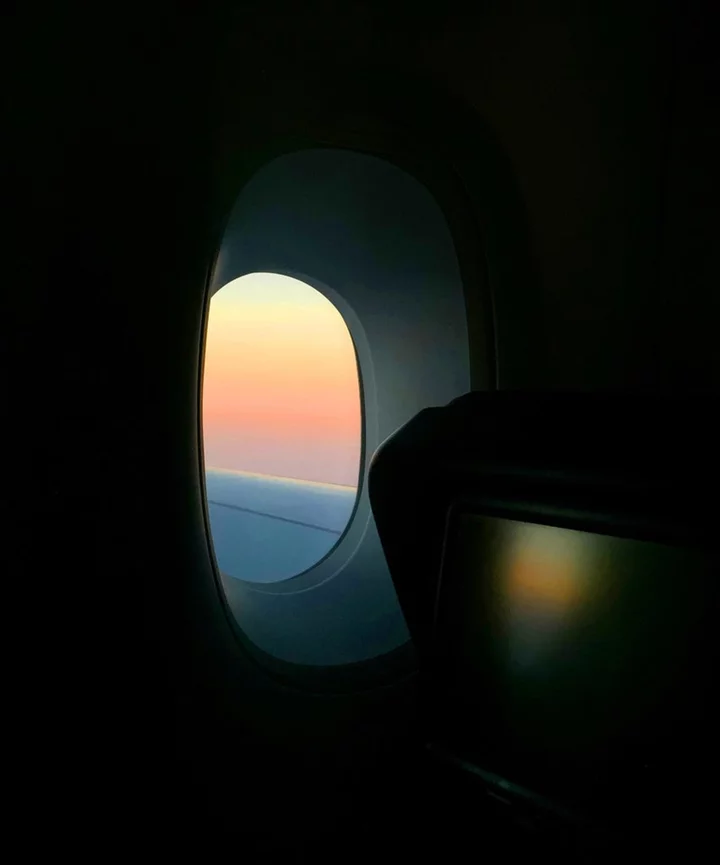While I wouldn’t put myself in the category of someone who has an intense phobia of flying (e.g. avoiding it at all costs), the cabin of a plane has always been a nightmare playground where my long-held anxiety kicks into overdrive. No matter how much I enjoy a pre-flight Nando’s, the physical steps towards the gate makes my teeth clench and my mind begin to play out a disaster film, starring me as the main character.
My stress tears once got so bad on a flight that a neighboring woman started to panic just looking at my terrified expression, creating some sort of infectious anxiety chain reaction down the row. But it doesn’t just surface in my reality: dreams of being on an aircraft that’s falling backwards have regularly haunted me during times of stress.
Even thinking about those things makes my chest physically tighten, despite every single one of those flights landing safely. This feeling of somewhat illogical impending doom seems to be shared by others. From from September 1, 2022 to February 13, 2023, Hypnotherapy Directory saw an 80% increase in new users looking for support with their fear of flying. Due to the commonality of the condition, the conversation around “getting over” my flight anxiety has never been too far away, with many people in my life recommending a stiff drink or an in-flight sleeping tablet to help combat the issue.
But as someone who can get a hangover that lasts for days, a friend suggested that I look into hypnotherapy instead. If, like me, you associate hypnosis with The Jungle Book snake and his psychedelic color-changing eyes, then it’s likely that your skepticism around the subject is fairly high. This imagery is perhaps why I never considered the treatment as a viable option for combating my concrete fear of flying. But with my personal method of white-knuckling it not getting me any closer to stress-free flying, it felt like time to actually try something new.
As it turns out though, the “look into my eyes” trope doesn’t actually have much to do with cognitive hypnotherapy. The real-life practice aims to create long-term change in relation to fears, addictions, and consistent negative thought patterns, and intends to give people respite from feelings of anxiety and dread by rewiring the neural pathways. Rather than being in a deep state of sleep, the process lulls you into a deeply relaxed mode, using music and suggestibility to gently allow you to tune out of your conscious mind and access the subconscious mind, which is open to change.
Lydia Johnson, clinical hypnotherapist and founder of the London Clinic of Hypnotherapy, says the process can be very effective in helping people combat issues with planes. “If you want to overcome a fear of flying, you may try everything consciously to do it, but you will still sustain the overwhelming fear, as long as your subconscious mind retains this terror,” she tells Refinery29. “Hypnotherapy can change and update your irrational deep-seated fears so it feels comfortable, even enjoyable, so there’s no white knuckling needed again.”
Deciding to take an uncharacteristic “don’t knock it until you’ve tried it” approach, I booked to embark on a hypnotherapy intensive that aims to help leave ongoing stress patterns behind. According to Johnson, the process would start with an in-depth session to understand my individual needs and then close with hypnotherapy, where clients enter a trance-like state called the theta state (before deep slumber) where ideas, concepts and lifestyle improvements are suggested to you.
While I didn’t think I would be watching air safety demonstrations on loop, the lack of focus on planes themselves came as somewhat of a shock. Instead we discussed what my life looked like in general, my experiences at school, my fulfillment in my job, and of course, my upbringing. It was a quiet and then all-at-once unfolding of my wider, generalized anxiety and how it manifests in my everyday life. Over the course of three hours, we barely even mentioned planes, instead focusing on my overall need for control and tendencies to jump to worst-case-scenarios in every area of my life.
It was alarmingly apparent to me how much my anxiety had impacted my life and really how little I had actually done to try and actively resolve it. I was overwhelmed with the amount of emotion I had pouring out of me, and how strange it felt for someone to explain that anxiety was not who I was, but that I was merely a person experiencing anxious thoughts. As we worked on this healthy reframing, the actual hypnosis part began. Johnson asked me to lay back on a plush green velvet couch before she started reciting a soothing monologue.
Mixed in with the sounds of lapping ocean waves, she spoke about freeing myself from my anxious thoughts, encouraging me to separate my identity from the anxiety itself. As Johnson spoke, she recorded herself, creating my very own hypnosis tape. She then sent me home with instructions to listen to the tape every night for the next 21 days.
For the next three weeks, I committed myself to the recording, as well as adding in yoga and cold showers to my daily routine on Johnson’s recommendation (both of which are shown to soothe the nervous system). I felt a genuine shift in my outlook on my mental health, feeling that for once I might actually be able to give myself a break from the constant train of negative thoughts. This was a strange and delightful revelation that I actually had the power to control my mind, something I hadn’t ever considered a real possibility until now.
But even with my growing sense of authority over my anxiety, the specificity of my issue with flying still needed to be addressed. Heading back to the clinic in the run up to my summer vacation, we discussed my progress and made a plan to create a new recording, this time tackling the beast head on. Discussing my tendency to catastrophize and my physical panic responses to take off, we spoke about the need to live in the present moment, accept the safety of the situation (despite my lack of control), and how to actively recognize and move away from the negative thought when it enters my brain on the plane.
We spoke about romanticizing the experience and focusing on the positive associations with travel and my very real enjoyment of exploring new places. It was another lesson in controlling my own thoughts and how “replaying the boxsets” of negative experiences will actively release cortisol and trigger myself into spiraling. As I spent the next week listening to her ASMR-style recording about my upcoming trip, I tried to remind myself how good it would feel to be calm on the plane and how I easily had the power to make that happen for myself.
Under Johnson’s advice, I wore a nice outfit to the airport, I got nice food, I had a wander around the shops and glamorized the experience as best I could, but in actuality, the airport has never been my issue. Then I stepped onto my flight, which ended up being over an hour delayed and sat on the tarmac, leading me to get progressively hotter and overstimulated by the array of screaming babies in front and behind me. It was hard to focus my mind, but with the help of my noise-canceling headphones and curated playlist, I tapped at my collar bone and breathed deeply through take off and managed to remain relatively calm.
However, towards the end of the four-hour flight, we encountered some turbulence, which is where I started to struggle. While I had focused so much on the take off and mentally planning for my stress to vanish after the seatbelt sign went off, I had forgotten that turbulence is also a large part of my issues. While I had managed to distract myself reading for most of the flight, feeling those drops sent me into panic mode and I didn’t feel like I had the biggest grip on my fight or flight instincts.
While my partner said he thought I did really well, I couldn’t help but be disappointed that I hadn’t managed to cure my fear. Natasha Crowe, psychotherapist and Hypnotherapy Directory member, says the terminology of “curing” is avoided in the practice, instead reframing it into managing the fear. “We can’t control what happens on or during the flight itself, so we can only bring it back to what we can control and that is ourselves, our thoughts and behaviors,” she tells Refinery29.
In particular moments of stress, she also recommends trying to reframe nervousness into excitement, visualizing the destination you are headed to and how good it will feel to have overcome your fear. Other recommendations included avoiding alcohol, drinking water to activate your nervous system into rest and digest, using movies to help create a space of control and safety, and most importantly, always bringing yourself back to your breathing.
While I don’t feel like I can now bound onto any flight with glee, I do feel like admitting I have an issue and taking active steps towards helping it was a major moment in me helping myself to de-escalate my fears. As someone who has spent so long feeling that anxiety was a steadfast, unchangeable part of who I was, I felt proud of myself for even entertaining the idea that there is maybe a future for me where that isn’t the case.
With a 13-hour flight planned in November, I’ll be using my audio in the run up to it to try and get my mind in the healthiest place possible. In the end, I’m acknowledging that I deserve to help myself the best I can and that’s all any of us can do.









